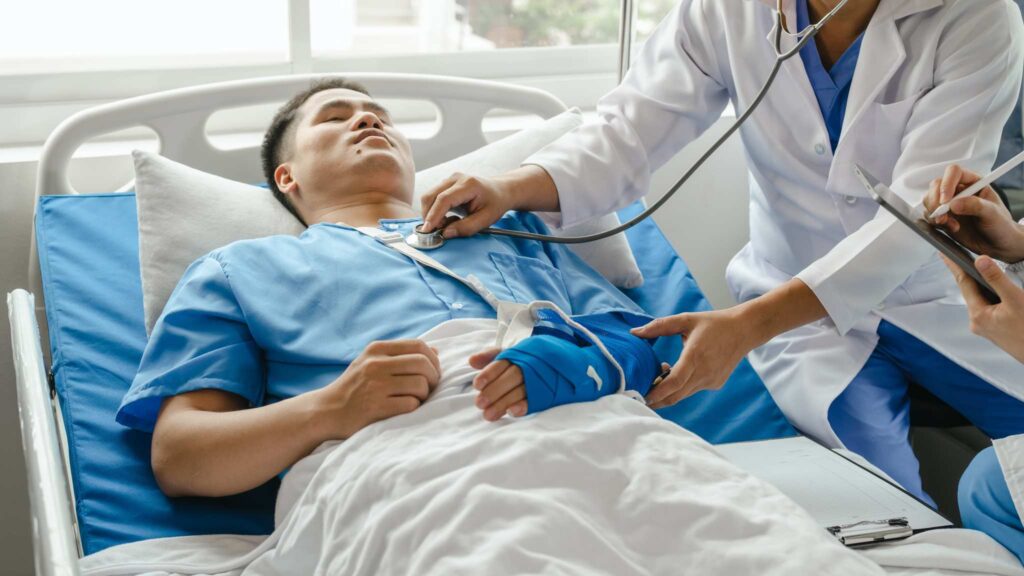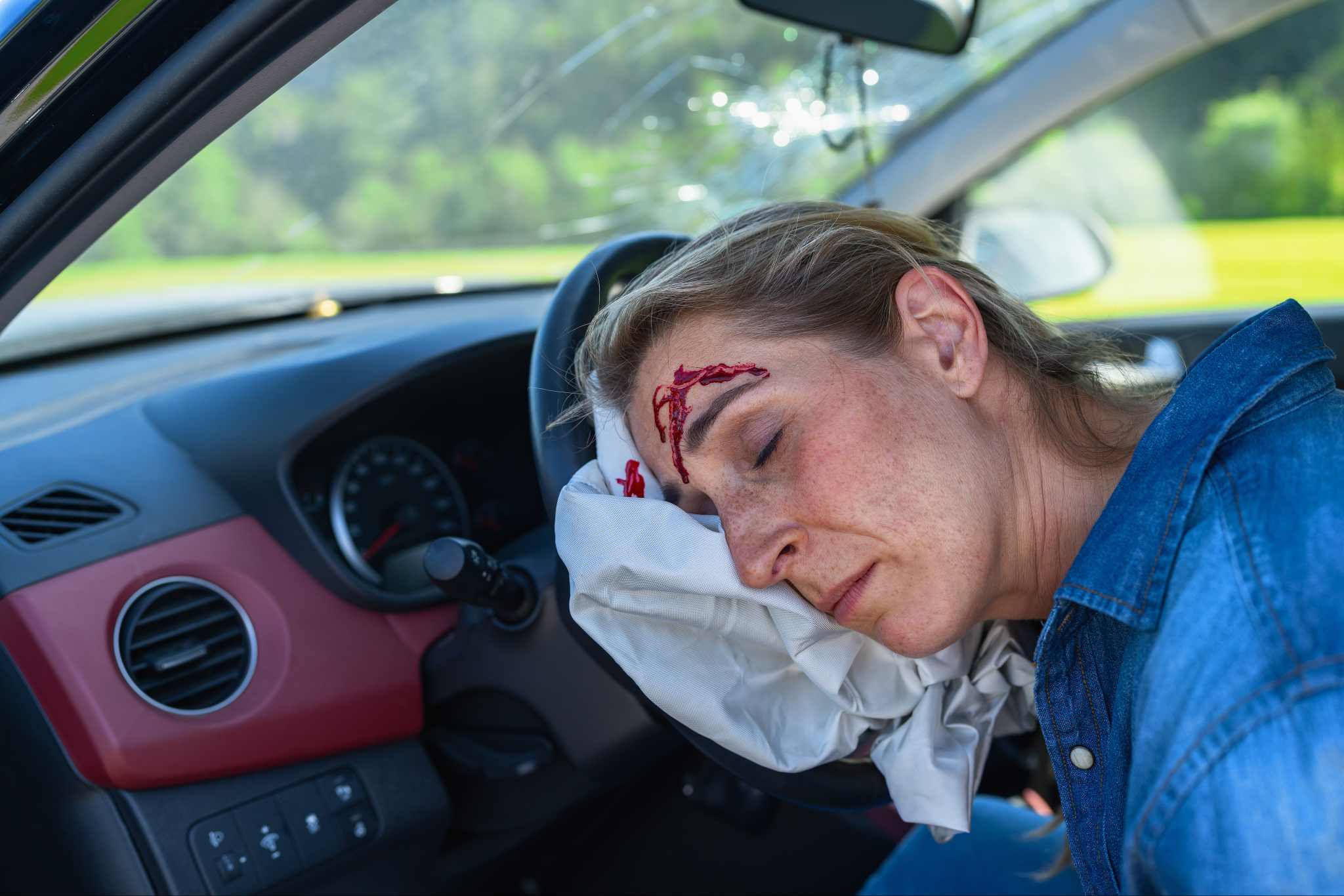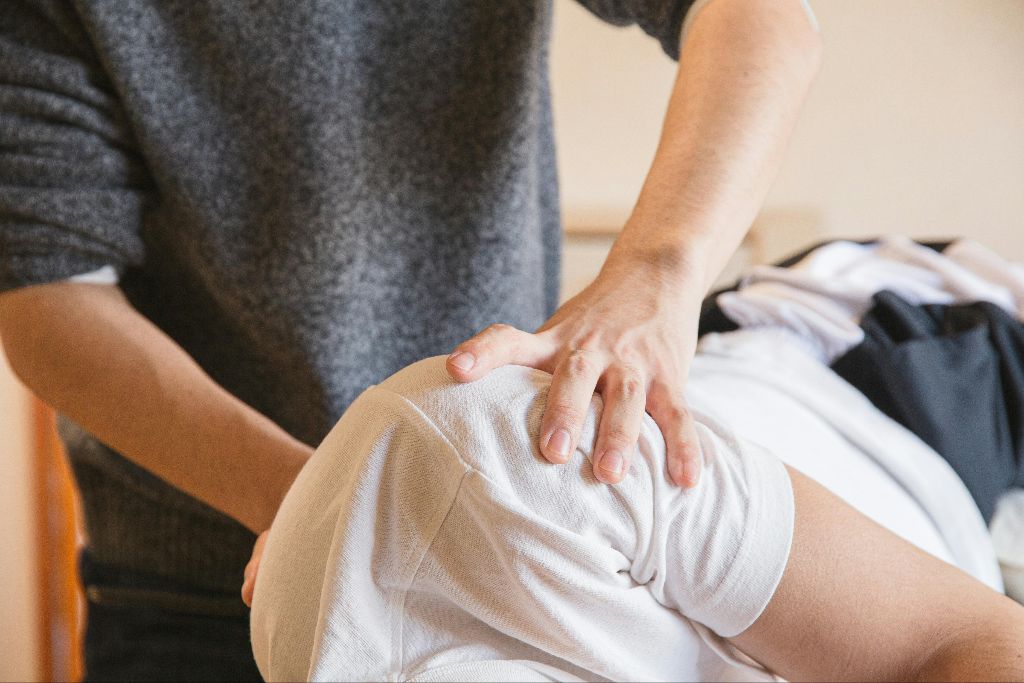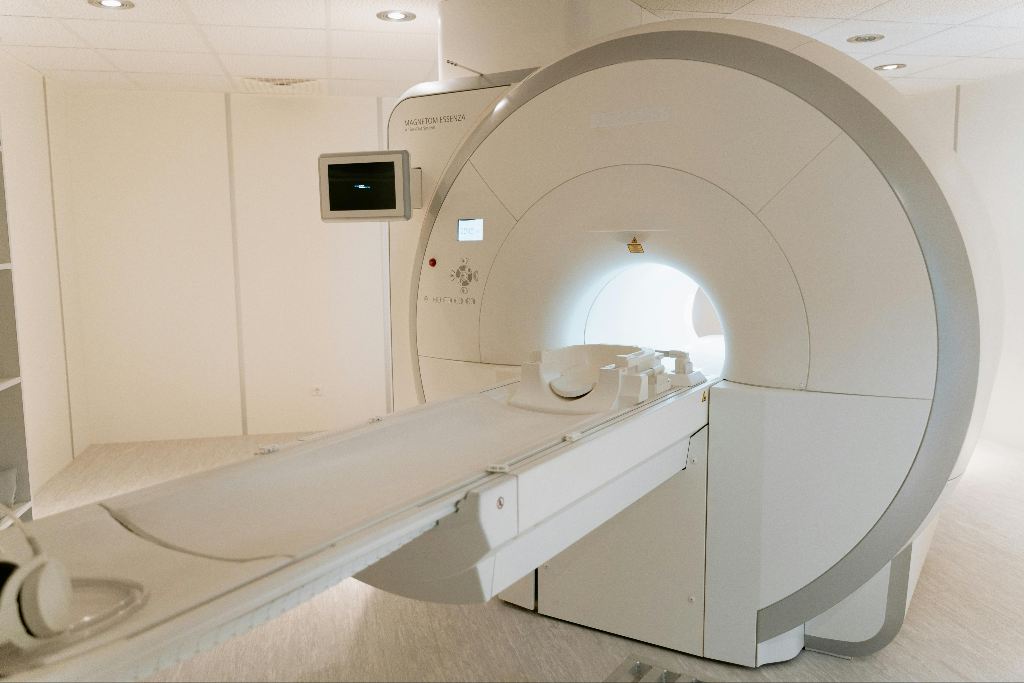Car accidents are an unfortunate reality that many people face, often resulting in a variety of injuries. While some injuries may be immediately obvious, others might not show symptoms until days or even weeks later. Understanding the common types of injuries that can occur from car accidents is vital for ensuring timely medical intervention, which can make a significant difference in recovery and long-term health. Let’s explore some of the most frequent injuries resulting from car accidents, their symptoms, and why recognizing these signs is essential.
Whiplash from Car Accidents
Whiplash is one of the most commonly reported injuries following a car accident, particularly in rear-end collisions. This injury occurs when the neck experiences a rapid back-and-forth movement, similar to the cracking of a whip. The sudden motion can stretch and tear the muscles, ligaments, and tendons in the neck, leading to pain and stiffness.
Whiplash typically happens when a vehicle is hit from behind, causing the head to be thrown backward and then snap forward. This rapid motion can overstretch the soft tissues in the neck. The neck muscles and ligaments are not designed to endure such sudden and forceful movements, leading to strains and sometimes more severe injuries to the cervical spine.
Symptoms to Watch Out For:
- Neck pain that may worsen with movement
- Stiffness and reduced range of motion in the neck
- Headaches that often start at the base of the skull
- Dizziness or feelings of vertigo
- Tingling or numbness in the arms and hands
- Fatigue or a sense of being generally unwell
Whiplash symptoms may not appear immediately after the accident. It might take a few hours to a couple of days for symptoms to manifest. This delay makes it easy to overlook, but early treatment is crucial to prevent chronic pain or long-term complications.
Head and Brain Injuries from Car Accidents
Head injuries are a significant concern in car accidents and can range from mild concussions to severe traumatic brain injuries (TBIs). These injuries occur when the head is struck by or strikes an object, or when the brain is jostled inside the skull due to the force of the collision. Even without direct impact, the sudden deceleration or acceleration forces can cause the brain to move rapidly, potentially leading to injury.
Types of Head and Brain Injuries
- Concussion: The most common type of brain injury, caused by a blow to the head or violent shaking. It disrupts normal brain function temporarily.
- Contusion: A bruise on the brain itself, which may cause bleeding and swelling within the skull.
- Traumatic Brain Injury (TBI): A more severe form of brain injury that can result in long-term complications or disability. TBIs are categorized into mild, moderate, and severe, depending on the symptoms and extent of damage.
- Diffuse Axonal Injury: This injury occurs when the brain moves back and forth in the skull, causing tearing of nerve tissues. It is often severe and can lead to long-term damage.
Symptoms to Watch Out For:
- Persistent headache or pressure in the head
- Loss of consciousness, even briefly
- Confusion or disorientation
- Nausea or vomiting
- Slurred speech or difficulty finding words
- Sensitivity to light or noise
- Changes in behavior or mood, such as irritability, anxiety, or depression
- Memory problems or difficulty concentrating
- Drowsiness or inability to wake up
Head and brain injuries can have subtle symptoms that develop gradually, making it crucial to seek medical evaluation even if there are no immediate signs of injury. Early detection and treatment can prevent worsening symptoms and long-term complications.
Back and Spinal Cord Injuries from Car Accidents
The force of a car accident can lead to various back injuries, including strains, sprains, herniated discs, and spinal cord injuries. The spine is a complex structure of bones, muscles, nerves, and tissues, all of which can be damaged in a collision. These injuries can significantly impact mobility, sensation, and overall quality of life.
Common Back and Spinal Cord Injuries:
- Herniated Disc: Occurs when the soft center of a spinal disc pushes through a crack in the tougher exterior, pressing on nerves. This can cause pain, numbness, or weakness.
- Spinal Fractures: These are breaks in the bones of the spine, often resulting from the intense force of a car crash. Spinal fractures can range from minor, stable fractures to severe ones that can lead to paralysis.
- Spinal Cord Injury: Involves damage to the spinal cord itself, potentially resulting in partial or complete loss of motor function and sensation below the level of injury. Spinal cord injuries are life-altering and require immediate medical attention.
Symptoms to Watch Out For:
- Severe pain in the back that may radiate to the legs or arms
- Numbness or tingling in the extremities
- Muscle weakness or paralysis in the legs or arms
- Difficulty walking, standing, or maintaining balance
- Loss of bladder or bowel control
- Persistent muscle spasms or stiffness
Back and spinal cord injuries can lead to long-term disability if not treated promptly. Immediate medical evaluation and imaging studies are often necessary to diagnose the extent of injury and plan appropriate treatment.
Broken Bones and Fractures from Car Accidents
The impact of a car accident can cause various fractures, depending on the force and direction of impact. Broken bones are common in car accidents due to the body being thrown against hard surfaces, crushed, or subjected to immense pressure. These injuries can range from simple breaks to complex fractures requiring surgical intervention.
Types of Fractures:
- Simple Fracture: The bone breaks but does not pierce the skin. Also known as a closed fracture.
- Compound Fracture: The bone breaks and pierces through the skin, increasing the risk of infection.
- Comminuted Fracture: The bone shatters into several pieces, often due to high-impact trauma.
- Greenstick Fracture: Common in children, where the bone bends and cracks but does not break completely.
- Hairline Fracture: A small crack in the bone, often difficult to detect initially.
Commonly Affected Bones in Car Accidents:
- Ribs: Often fractured due to impact with the steering wheel or seatbelt restraint.
- Arms and Wrists: Typically injured when individuals brace for impact or during airbag deployment.
- Legs and Knees: Can be injured by hitting the dashboard or being crushed in a severe collision.
- Pelvis: Pelvic fractures are serious and often result from high-impact collisions, potentially causing damage to internal organs.
Read more: Most Common Back Injuries from an Accident
Symptoms to Watch Out For:
- Severe pain at the injury site, worsened by movement or pressure
- Swelling, bruising, or visible deformity
- Inability to move the affected limb or bear weight
- Hearing a snap or crack at the time of injury
- Numbness or tingling around the fracture site
- Bone protruding through the skin (in the case of compound fractures)
Immediate medical attention is essential for diagnosing the type of fracture and ensuring proper treatment. This may involve immobilization with a cast or splint, realignment, or surgery, depending on the severity of the fracture.
Soft Tissue Injuries from Car Accidents
Soft tissue injuries are another frequent outcome of car accidents, affecting muscles, ligaments, and tendons. These injuries, which include sprains, strains, and contusions (bruises), are often caused by the sudden impact or jarring movements experienced during a collision. Even though soft tissue injuries might appear less serious than broken bones or head injuries, they can lead to significant pain and discomfort. If not properly treated, these injuries can become chronic, causing ongoing pain and mobility issues.
Understanding Soft Tissue Injuries:
- Sprains: These occur when ligaments, the bands of tissue connecting bones, are stretched or torn. Ankle and wrist sprains are common in car accidents due to sudden twisting or impact forces.
- Strains: Similar to sprains, strains involve stretching or tearing, but they affect muscles or tendons (the tissues that connect muscles to bones). Whiplash is a common example of a neck strain resulting from car accidents.
- Contusions (Bruises): These are caused by blunt force trauma that crushes small blood vessels but doesn’t break the skin. Contusions can cause swelling, pain, and discoloration.
Symptoms to Watch Out For:
- Pain and tenderness in the affected area
- Swelling and bruising
- Limited range of motion or stiffness
- Muscle weakness or spasms
- A feeling of instability in the affected joint
Soft tissue injuries may not be immediately visible and can sometimes take a few hours or days to present symptoms. Seeking medical advice and appropriate treatment, such as rest, ice, compression, elevation (RICE), physical therapy, or medication, can significantly enhance recovery and prevent further complications. Read: Orthopedic Treatment For Soft Tissue Damage
Internal Injuries from Car Accidents

Common Types of Internal Injuries:
- Internal Bleeding: Can occur when blood vessels are damaged and blood leaks into areas inside the body. This can be particularly dangerous because it may not cause immediate pain or noticeable symptoms.
- Organ Damage: Organs such as the liver, spleen, kidneys, and lungs can be bruised or lacerated during a car accident. These injuries can be severe, leading to loss of organ function or life-threatening complications.
- Abdominal Trauma: The abdomen can suffer from blunt force trauma, which may damage internal organs and cause internal bleeding or bowel perforation.
Symptoms to Watch Out For:
- Severe abdominal pain or tenderness
- Swelling or bruising of the abdomen
- Dizziness, fainting, or loss of consciousness
- Blood in urine or stools
- Vomiting blood or coughing up blood
- Rapid heartbeat and low blood pressure (signs of shock)
- Pale or clammy skin
Given the hidden nature of internal injuries, it is critical to seek immediate medical attention after a car accident, even if there are no visible wounds. Early detection through diagnostic tests such as CT scans or ultrasounds can identify internal injuries, allowing for timely treatment that can save lives.
Learn more about What Tests are Done After a Car Accident
Psychological Injuries from Car Accidents
While physical injuries are often the focus after a car accident, the psychological impact should not be underestimated. The trauma of being in a car accident can lead to significant emotional and mental health challenges. Psychological injuries can be just as debilitating as physical ones and can have a lasting impact on a person’s overall well-being.
Common Psychological Injuries:
- Post-Traumatic Stress Disorder (PTSD): PTSD can develop after experiencing or witnessing a traumatic event. In the context of car accidents, individuals might relive the event through flashbacks, have nightmares, or avoid situations that remind them of the accident.
- Anxiety: This can manifest as a constant state of worry or fear, particularly about driving or being a passenger in a car. Anxiety symptoms can range from mild unease to severe panic attacks.
- Depression: Feelings of sadness, hopelessness, and loss of interest in activities once enjoyed can indicate depression. Depression following a car accident can be triggered by the trauma itself or the impact of physical injuries and lifestyle changes.
Symptoms to Watch Out For:
- Persistent feelings of fear or anxiety
- Flashbacks or intrusive thoughts about the accident
- Avoidance of driving or situations that remind of the accident
- Changes in sleep patterns, including insomnia or nightmares
- Irritability, mood swings, or anger outbursts
- Difficulty concentrating or making decisions
- Feelings of hopelessness or thoughts of self-harm
Addressing psychological injuries is just as important as treating physical ones. It is essential to seek support from mental health professionals who can provide therapy, counseling, or medication if needed. Early intervention for psychological conditions can significantly improve outcomes and help individuals recover their mental health and well-being.
Trust AICA Orthopedics for Comprehensive Car Accident Injury Care
Recognizing and treating injuries from car accidents promptly is crucial for a full recovery. At AICA Orthopedics, we specialize in the comprehensive diagnosis and treatment of car accident injuries. Our integrated approach combines advanced diagnostic tools, such as MRI and CT scans, with a personalized treatment plan tailored to each patient’s needs.
AICA Orthopedics is home to a dedicated team of specialists, including orthopedic doctors, neurologists, chiropractors, and spine specialists, all working together to provide the best possible care. Our collaborative approach ensures that all aspects of a patient’s health are addressed, promoting faster and more complete recovery. We understand the physical and emotional challenges that follow car accidents, and our compassionate care aims to support you every step of the way.
If you or a loved one has been involved in a car accident, don’t wait for symptoms to worsen. Find the nearest AICA location today to schedule an appointment. Let us help you on your path to recovery with the expert care you deserve.





